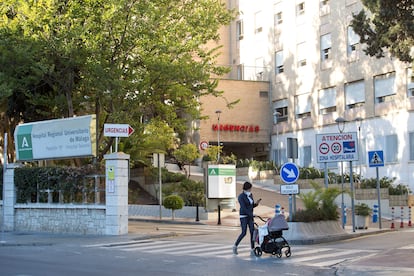The coronavirus outbreak in southern Spain that turned a Christmas bash into a nightmare
The 170 hospital workers who gathered for a meal in Málaga had taken antigen tests, but the virus spread to 80 diners and the health center had to hire extra staff

On the first day of December, around 170 healthcare professionals got together at a restaurant in the Teatinos neighborhood of Málaga, in southern Spain. They were there for a Christmas lunch organized by the workers of the Intensive Care Unit (ICU) at the Regional University Hospital of Málaga, formerly known as Carlos Haya Hospital. They had been organizing the event for a month and had reserved the entire restaurant for themselves. Guests paid €55 per person for a full meal and drinks, but were required to take an antigen test as a condition for admission. Everyone’s results came in negative and nobody was left out of the Christmas lunch, which extended into the night.
Three days later, on December 4, several of the guests had symptoms compatible with Covid-19. On December 5, the regional government of Andalusia declared an outbreak affecting 22 people; a day later that number had risen to 68, and by December 7, to 80. The Christmas celebration had turned into a nightmare, undermining healthcare workers’ image, forcing the hospital to hire extra staff and highlighting the false sense of security generated by the tests.
Official exams
The Christmas lunch was organized a month in advance. At the beginning of November, hospital workers started to sign up. They were keen to celebrate after a year and a half of being on the front lines of the war against the pandemic. On top of this, many of the guests had just taken an official public examination to secure a permanent position with the Andalusian Health Service. These exams were held on November 28 at Málaga University, inside classrooms at the Teatinos campus, with the windows open and plenty of ventilation. More than 4,000 people sat the exams, many of whom went to nearby bars for drinks after completing the test. “We think that’s the key – all those people spending the afternoon without masks inside bars in the area,” says a nurse, who points out that not all the people associated with the outbreak went to the Christmas lunch.
The lunch
On December 1, some 170 ICU workers showed up for the Christmas lunch at a restaurant that had been reserved for them. It was a late meal as many of them had been working all morning. Some of them had taken their antigen test at the hospital, and others at home, but everyone reported negative results. After lunch it was time for drinks, and more colleagues began to show up. By the end of the afternoon, there were more than 200 people inside the restaurant. The vast majority of them had already had their third dose of the Covid-19 vaccine, although some of them had had it very recently.
The first symptoms
Three days later, on December 4, a few people who’d been to the lunch began to experience sore throats and other symptoms associated with the coronavirus. They took new tests and some positives began to emerge. Those testing positive went to the University Regional Hospital to take a second antigen test. The positive results were confirmed and they began to notify their colleagues. They also alerted the restaurant, where managers said that all staff members undergo periodic PCR tests. New antigen tests on employees following news of the outbreak turned out negative. “They are all vaccinated,” said a spokesperson for the restaurant, which was closed for more than a year due to the pandemic.
The outbreak
On December 5, more people began to experience mild symptoms and went to get tested. The result was positive. Like their colleagues the day before, they were all sent home and told to self-isolate for seven days. According to hospital sources, until a few weeks ago, healthcare workers who tested positive on an antigen test were still obliged to go to work, but since the emergence of the omicron variant the protocol has changed and they now have to self-isolate at home for seven days.
That same day, Andalusia’s public health department flagged up an outbreak affecting 22 people attending the Christmas lunch. The news was published by the regional daily Diario Sur that afternoon. Then came the knock-on effect: the Public Health Emergency Company (EPES), which manages the 061 emergency hotline, canceled its own Christmas staff party. Meanwhile, criticism directed at the health workers was addressed by the health sector’s union. “In Andalusia, there are no restrictions regarding venue capacity and they [the healthcare workers] had done more than most by taking an antigen test prior to the event,” said Carlos Bueno of the UGT labor union.
Cases multiply
On December 6, as the controversy gathered momentum, Andalusia’s Public Health department confirmed that positive cases connected to the outbreak had risen to 68. Most were nurses, although there were also a few doctors. The symptoms were always mild or negligible. The hospital maintained that its level of care had not been undermined, though it was forced to bring in staff from other departments. Meanwhile, health officials began recommending that public and private healthcare centers cancel all Christmas events. “Unfortunately, we have no choice but to take care of ourselves in order to take care of others,” read a message to workers at a private clinic.
Other units of the Regional Hospital also canceled their Christmas lunches while many of those involved in the outbreak sought to defend themselves from the public criticism, noting the thousands of people seen at bars and restaurants in downtown Málaga over the long weekend, the crowds coming to see the Christmas lights and the massive concerts in music venues. The CSIF union, which represents public workers, said it is “very unfair that they are being stigmatized for this outbreak” and underscored that attendees had not “broken any restrictions, but instead followed the recommendations in effect at this time.”
Authorized reinforcements
Andalusia’s Public Health department has since said that the outbreak now affects 80 people. As a result, the Andalusian Health Service has authorized the hiring of new ICU personnel. Sources at the Regional Hospital have confirmed that “reinforcement professionals are being hired” and the unions stated that 35 new contracts have been authorized, though many of those that have been called in as substitutes have reportedly declined the offer.
“Of the 8,000 healthcare workers whose contracts were not renewed on November 1, 1,500 were from Málaga and more than 600 have already moved to Catalonia, where they are being offered one-year contracts,” explained Bueno, the UGT representative at the hospital. Bueno said that intensive care “is guaranteed thanks to the fact that the staff are either doubling shifts or are happy to be moved to the ICU from another unit. Their work is proving exemplary.” Meanwhile, regional health authorities are largely refraining from becoming involved. “We don’t talk about outbreaks,” said one department source. The Regional Hospital’s management is also remaining silent on the issue.
Tu suscripción se está usando en otro dispositivo
¿Quieres añadir otro usuario a tu suscripción?
Si continúas leyendo en este dispositivo, no se podrá leer en el otro.
FlechaTu suscripción se está usando en otro dispositivo y solo puedes acceder a EL PAÍS desde un dispositivo a la vez.
Si quieres compartir tu cuenta, cambia tu suscripción a la modalidad Premium, así podrás añadir otro usuario. Cada uno accederá con su propia cuenta de email, lo que os permitirá personalizar vuestra experiencia en EL PAÍS.
¿Tienes una suscripción de empresa? Accede aquí para contratar más cuentas.
En el caso de no saber quién está usando tu cuenta, te recomendamos cambiar tu contraseña aquí.
Si decides continuar compartiendo tu cuenta, este mensaje se mostrará en tu dispositivo y en el de la otra persona que está usando tu cuenta de forma indefinida, afectando a tu experiencia de lectura. Puedes consultar aquí los términos y condiciones de la suscripción digital.









































